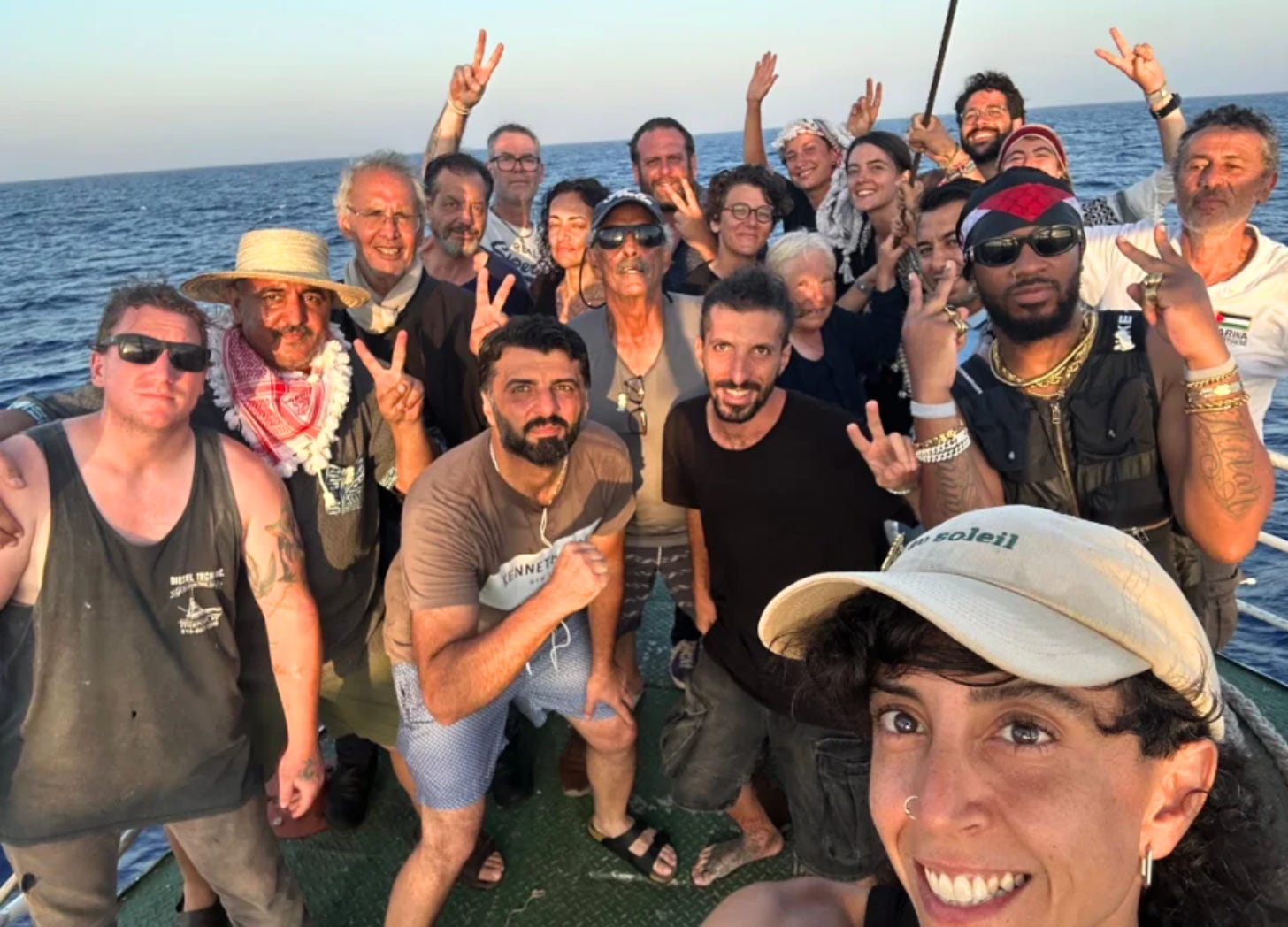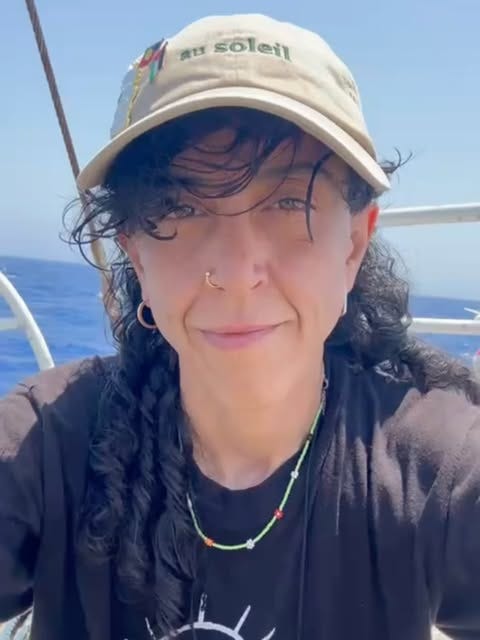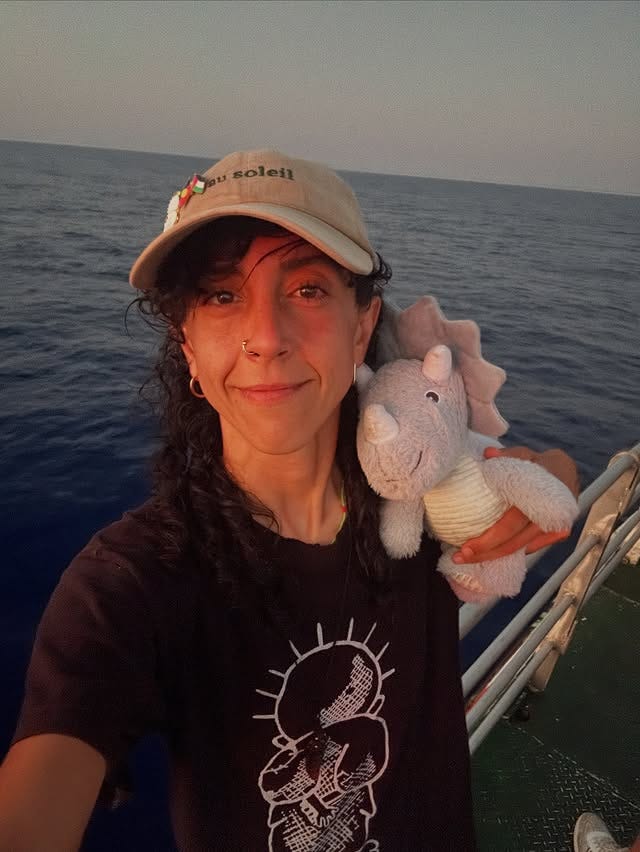Australian flotilla activist tells of shocking treatment by Israeli soldiers
Tan Safi says soldiers assaulted, strip searched and humiliated volunteers from the Handala aid ship
There is still a slight tremor in Tan Safi's voice.
Speaking to Deepcut a day after being released from a Sydney hospital, Safi is still recovering from four days inside Israel's Givon Prison.
Safi and 20 other activists – including French politician Emma Fourreau, US union leader Chris Smalls and Iraqi-American journalist Waad Al Musa – were volunteers aboard the Handala, a humanitarian aid ship that was illegally boarded by Israeli soldiers in international waters on July 26. A vessel of the Freedom Flotilla Coalition activist organisation, the Handala was carrying food, medicine and baby formula intended to break Israel's devastating siege of Gaza.
The volunteers spent up to a week in Israeli jails, where they claim they endured physical assault, sexual humiliation, deprivation of medication and squalid conditions.
The Israeli Embassy and the Department of Foreign Affairs and Trade did not respond to questions.
Inside an Israeli jail
Safi joined the Freedom Flotilla more than a year ago. They had originally planned to sail to Gaza from Turkiye aboard the Akdenez in April 2024, but was forced instead to follow the Handala to Europe when the Akdenez was controversially deflagged. Safi also narrowly missed out on sailing aboard the Conscience, another Freedom Flotilla vessel that was bombed by Israeli drones in international waters off the coast of Malta in May.
Safi says the volunteers and crew began noticing strange occurrences in the hours before Israeli soldiers boarded the ship.
"It was really odd, because about an hour before they intercepted, there was this fog that surrounded the Handala. Some of the crew members started falling asleep in really strange positions, almost like they were knocked out," Safi told Deepcut.
"It didn't make any sense – we were in such a heightened state of awareness and hyper-vigilance waiting for this possible illegal interception. It felt like we were drugged."
Between 30 and 35 heavily armed soldiers boarded the Handala off the coast of Egypt. Safi claims that the Israeli soldiers were wearing GoPros, with at least one carrying a DSLR camera. At first, the soldiers were relatively restrained, they recount.
"Once the cameras were switched off, though, they started showing their true colours," Safi says. "Some of them stated boasting about having just come from Gaza."
The Handala was sailed to the port of Ashdod, where soldiers in balaclavas forced the volunteers off the ship. From there, Safi says, the volunteers were transported to Givon, about 40 minutes southwest of Tel Aviv.
Once in Givon, Safi says the activists were separated and held in separate rooms.
"When I asked for my lawyer, they grabbed me by the arms, these two militants wearing balaclavas. They dragged me by the arms, threw me outside, went through all my things, and made me take off all my clothes and squat," Safi says.
"It was so humiliating."
From there, Safi was taken to an interrogation room. They claim the Israeli authorities tried to coerce they and other Handala volunteers into signing a document confessing to attempting to illegally enter Gaza, and threatened them with lengthy jail sentences if they refused.
"I said I would never sign anything that wasn't true," Safi tells Deepcut.
"They said, 'If you don't sign this, you realise that you'll be going to prison for a long time. And I said, 'Well, that's entirely up to you.'"
'There was such immense hatred for us'
One of Safi's most vivid memories is of a particular officer's face when the prison authorities forced the volunteers to strip and pose for photographs.
"He had a DSLR and a phone, and he was taking photos of everyone getting undressed and showing them to other officers, and they were high fiving him and laughing. He was having the time of his life," Safi says. "That's the only time I saw any of them truly smile. It was him. He was really enjoying the humiliation of it all."
"The disdain on their faces was palpable. There was such immense hatred for us. Just soullessness. I kept looking for some kindness, or something to build some rapport, you know? And there was just absolutely nothing."
While Safi suffered bruises and contusions from being pushed and thrown against walls, they especially feared for their safety when the Israeli soldiers tried to remove their nose ring.
"I tried to explain to them that I couldn't, because it's a specific kind of ring where you need jewelry tools or a jeweler to take it out. So then they came into the room with these enormous bolt cutters, and that's when I really freaked out," Safi says.
"I said, 'Please, I don't want you to rip my nose out. I don't want you to hurt me.' And they said, 'Well, take it out or we'll take it out for you'. Then they just tried cutting it, and it was pulling at my nose. It hurt a lot, but it didn't work. So they sent me to another room and tried again with a different pair of bolt cutters. I was just clenching my eyes and fists waiting for my nostril to be ripped apart. But it didn't cut, so they gave up."
Despite being warned ahead of time about the likely treatment the volunteers would receive from Israeli authorities, Safi was still shocked at the impunity with which the soldiers acted.
"It was surreal. Despite our passports of privilege, despite the fact that they knew we would come home and talk to journalists or post on social media, there was absolutely no deterrent," Safi says. "There are more than 10,000 Palestinians in those prisons, and so many of them are children. I could hear some of them screaming at night and in the morning, howling in pain. I can't imagine what they're doing to them."
A call to action
In a letter written before the Handala set sail, Safi and fellow Australian activist Robert Martin urged the prime minister to halt Australia's sale of arms to Israel and "stop protecting Israel from any accountability or consequence".
"We have seen you be selective with your compassion, and we have seen you in moments of integrity too," the letter states. "We call on you to prioritise what's left of your humanity, not your paychecks."
"I actually fought for Anthony Albanese to be elected. I believed in him," Safi tells Deepcut. "I remember watching him in parliament standing up for Palestinians in a way I hadn't seen any other Australian politician do. That's why I just don't believe in the system anymore at all."
A day after speaking to Deepcut, and two days after being discharged from hospital, Safi took part in Sydney's massive demonstration in support of Palestine, addressing the crowd and walking across the Sydney Harbour Bridge.
"They did damage to my right shoulder, I can barely lift a fork," Safi says. "But I have to be there."
"None of us are particularly special, those of us who were on Handala. None of us are particularly courageous or brave. We are just people. And so I know that anyone is capable of it if they just follow that ache inside of them and that feeling that they can do more. Once we push hard enough, that's when our leaders will shift."






Thank you so much Safi and all those brave souls and shame on the Australian Government and media for not caring about this. We do care.
Thanks to safi and all those who keep trying to break the siege, shame on government